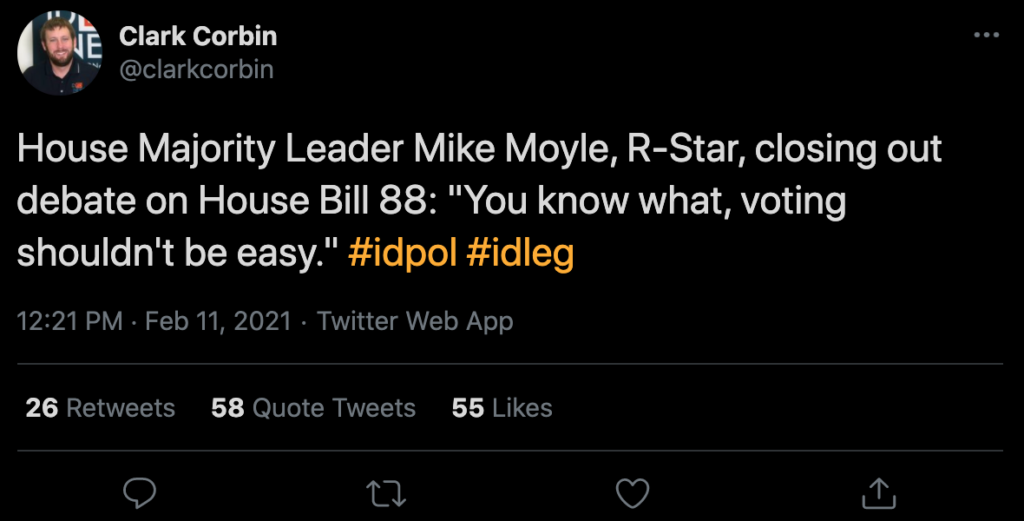Easy Come. Easy Vote? H88 sent to general orders….

That’s what House Republican Leader Mike Moyle declared on the floor when he proposed a bill to criminalize people for delivering others’ ballots. This legislation would make it harder for seniors, those with disabilities and low-income Idahoans to vote by imposing felony charges on the friends and neighbors who help them drop off their ballots. Many members of both parties in the House saw HB 88 for what it is—an attempt to criminalize delivering someone’s ballot at their request. Rep. Moyle stated himself “voting shouldn’t be easy”. HB 88 was moved to the House’s amending order and could be taken up again at a later date.
More Federal COVID19 Funding Finally Released in JFAC
JFAC finally started to consider appropriations of the federal covid relief funding this week, which still leaves $523.1 million awaiting appropriation, including funds for public health, child welfare, schools and higher education.
- $175M on Monday for a statewide Rental Assistance Program
- $862,400 on Tuesday for Meals on Wheels
- $24M for Child Care
Another Attack on Ballot Initiatives and Local Control
Senator Vick introduced S1110 on Friday to make citizen ballot initiatives much harder and even inserted an emergency clause into the bill to take effect immediately upon passing. The bill requires at least 6% of qualified voters in all 35 of Idaho’s legislative districts. Current law requires 6% of qualified voters statewide, as of the last general election, plus, within that, 6% from 18 of the 35 legislative districts.
After Idahoans voted to support Medicaid Expansion in 2018, the Legislature passed SB 1159 in the 2019 legislative session, which would have made it harder to introduce voter initiatives by requiring signatures from 10% of voters in 32 of the 35 legislative districts and cut the period for signature gathering from 18 months to six months. The Governor thankfully vetoed that bill.
This is such a troubling proposal especially within the context of all the other bills that the majority party has been introducing to limit the Governor’s statutory authority while increasing the power of the legislature AND in the context of SJR101 to amend the constitution to prohibit recreational or medical marijuana in our state in the future.
Rep Ehardt declared from the House floor that the Legislature should have more power than the other 2 branches of government and we see her peers following that sentiment.
Rep Giddings introduced a H153 in House State Affairs to split the university budgets because she didn’t like some of the curricular decisions being made like offering educational programs to understand racism; she wants to punish colleges and censor them if they offer programs that the majority of the legislature doesn’t like, which is a clear violation of the first amendment.
The majority party has been working to limit local control in H90 which would require the legislature to review any decisions about naming or renaming schools, roads, monuments by local governments. The Attorney General did issue an opinion at the request of Rep Ilana Rubel which states, “This bill’s procedure for approving and denying the mandated requests, legislative concurrent resolutions, likely has no legal effect and is therefore unenforceable.” In addition, it finds, “HB 90 may also violate constitutional prohibitions on local or special laws. Further, given the lack of definition of certain terms, HB 90 may implicate First Amendment concerns.”
More than 12 bills have been introduced to limit the Governor’s ability to declare an emergency and 11 bills to address elections and some of those are trying to eliminate absentee voting, restricting language on bond/levy initiatives, and making a felony for delivery a completed ballot.
The House passed two bills, HB67 and HB68, to strip public health districts and the Idaho Department of Health and Welfare from authority over schools, colleges, or universities in the state, regarding closures, mask orders or other restrictions relating to infectious diseases. The measures still call for collaboration with health authorities on those decisions. HB 67 passed on a 65-5 vote; HB 68, on a 59-11 vote.
It feels like the majority of our legislature is more interested in power and control instead of supporting local control and personal responsibility, choice, and self-determination. Sen Grow declared from the Senate floor that according to the constitution, it is the responsibility of the legislature to look after the “morality and sobriety of Idahoans.” I wish we would use the same vim and vigor to look out for the health outcomes and health care of our citizens, especially when the citizens voted for that.
Redistricting and the Census
Every ten years, the federal government is obligated by the US Constitution to conduct a census and 2020 was a census year. The States use the census data to adjust the boundary lines for federal and state legislative districts. This data is also very important to knowing more about our demographics so we can make good public policy and receive important resources.
Idaho has had significant population growth since the last census and that growth has not been evenly distributed across the State so we anticipate many district boundary lines will shift by quite a bit. Unfortunately, the census has had substantial difficulties and we will be getting the census data very late, creating a time crunch for Idaho to get our redistricting done in time for our next elections.
Under Idaho law, our redistricting is done by an independent commission. Once the commission is formed, there will be opportunities for public input, including public meetings. That information will be posted on the Legislature’s website.
Medial Cannabis Bill Introduced
In the House Health and Welfare Committee, Reps. Ilana Rubel and Mike Kingsley introduced a bill, HB108 or the Sgt. Kitzhaber Medical Cannabis Act, to legalize medical cannabis. It has yet to have an official hearing, but was printed. If passed, the legislation would be the most restrictive law of its kind in the country while providing some medical relief to people suffering from cancer or other diseases.
Legislature Intervenes on School District Elections
The House State Affairs Committee advanced HB106 to the full House to eliminate the August election date at which Idaho school districts hold bond, levy or recall elections. Prior to the divided voice vote, lawmakers heard from local school district officials who pleaded with them not to pass the bill, saying school districts don’t set their budgets until June, so the August election date is key for asking voters if they want to make up budget shortfalls through override levies or see cuts in their local schools.
My Legislation Introduced
S1098 – Contraception and Health Plans | This legislation allows women to receive up to a 12 (twelve) month supply of prescribed contraceptives if they so choose. Currently, many insurance plans reimburse for only a 1 (one) to 3 (three) month supply of contraceptive supplies, which can create unnecessary barriers for women. This bill merely increases accessibility to contraceptive medicine to help women in their own medication regimes. Full hearing is scheduled for Thursday, February 18 at 1:30pm in Senate Commerce and Human Resources Committee.
S1097 – Promissory Notes and Unfair Debt Collection Practices | This legislation clarifies the duration of time in which a junior lien holder may bring an action for deficiency resulting from the sale of a secured property. Idaho Code does not specify the time period in which such action may be brought; the results are extremely inequitable situations where junior lien holders are able to bring such actions at any point during the duration of an installment contract which could be up to 30 years. This bill was brought to me by a constituent who is an attorney and has directly observed how this loophole has created surprising and very traumatic consequences for people.
S1089 – Rape of a Spouse (Repeal of the law) | The purpose of this bill is to repeal a portion of Idaho law that provides exceptions to the criminal definition of rape based on the relationship of the parties (spouse), which is unnecessary and inappropriate. This bill updates Idaho law to define rape the same regardless of who is involved, by repealing in its entirety Section 18-6107. This law was originally introduced in 1977 and has evolved overtime. I was a little shocked that this law was still on the books. Most of my colleagues seem very supportive of removing it. There should be no defense for raping someone because they are your spouse. Idaho Code 18-6101 addresses rape and everyone should be accountable to the law regardless of relationship.
Certified Family Homes (CFH) and Tax Relief – Still trying to get a hearing | This legislation would allow someone who is the homeowner of a Certified Family Home to apply for the “circuit breaker” property tax relief program by exempting the payment they receive from the state for caring for someone 24/7 in their home from the income counted toward the application. In order to keep people with disabilities out of institutions, Idaho like other states in our country, allow people to become licensed to care for someone in their home and receive payments for caring for their health and well-being. This saves the state many thousands of dollars; on average someone in a CFH is compensated $53 per day versus $265 per day in an institution. I believe that low income folks should be able to apply for property tax relief without this compensation counting against them when they apply for property tax relief.
Adding FACES of Hope to the Charitable Contribution List – Denied a Hearing | This bill would have added FACES of Hope Victim Center in Boise to the list of charities where donors could receive a tax credit to incentivize their contribution and double the impact for the organization. Unfortunately, the committee chair would not allow a hearing at this time.
